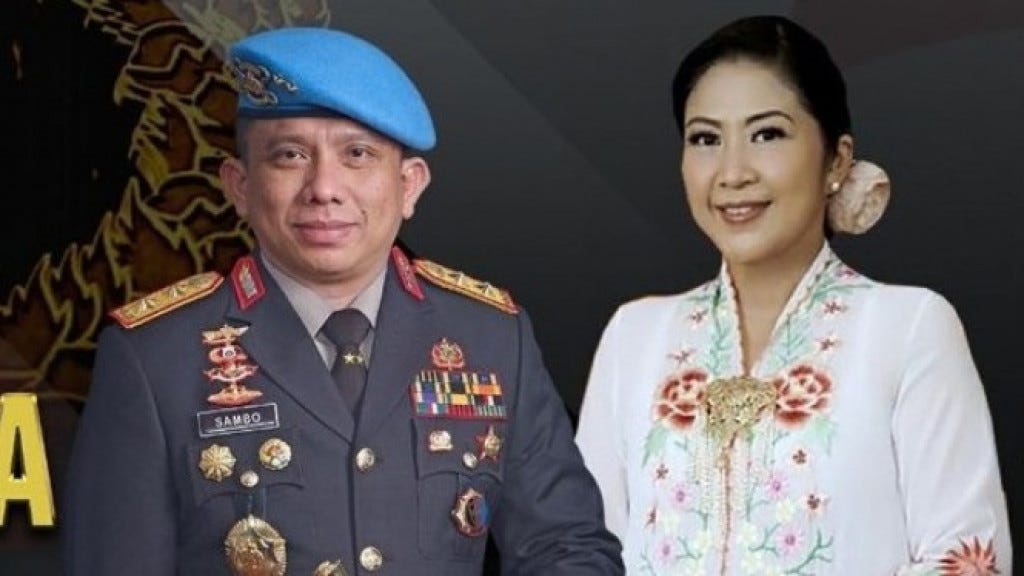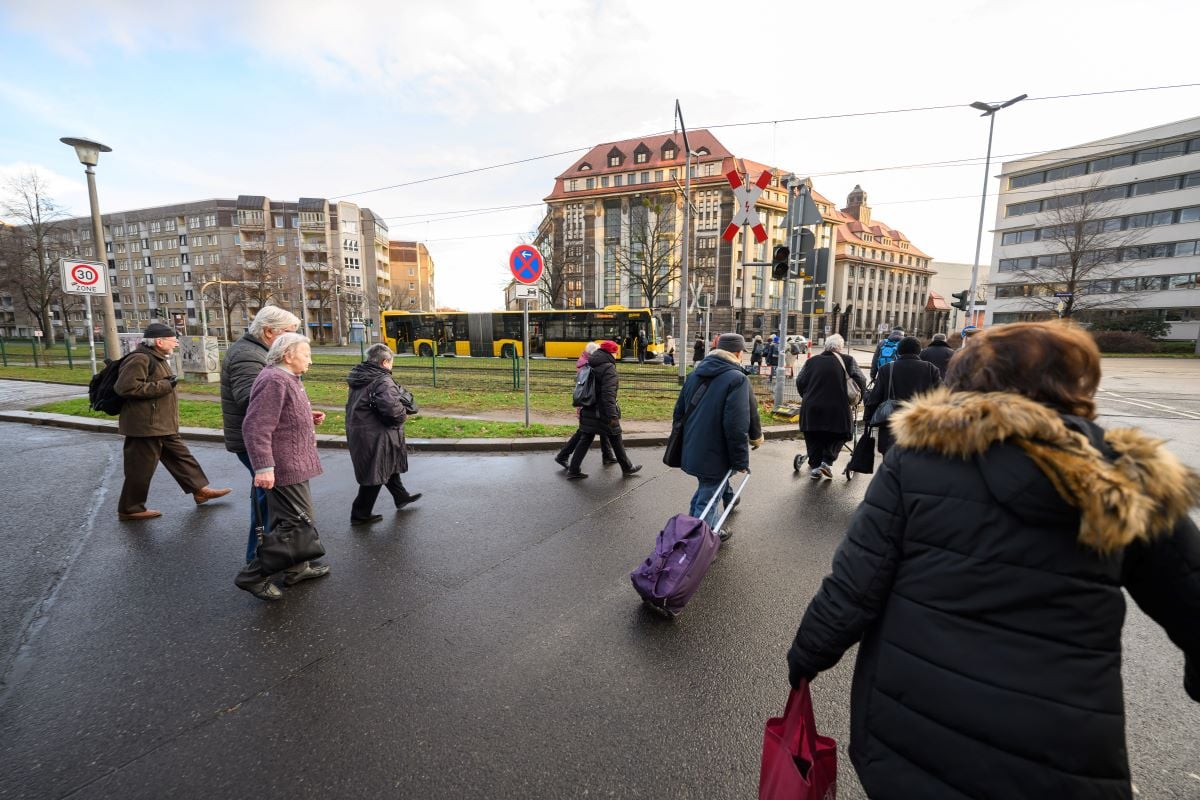In many ways, the essence of the Indonesian National Police is undergoing a virtually unprecedented public trial in Jakarta. At stake is the fate of a senior police general enmeshed in charges of a revenge killing of a junior officer who reportedly was having an affair with the general’s wife. In years past, something this messy would be swept away quickly and kept from public view. Indeed that appears to have been attempted in this case, which didn’t come to light until three days after it happened. Only later have details begun to leak out.
The murder of Brigadier Nofriansyah Yosua Hutabarat in a hail of gunfire inside General Ferdy Sambo’s house has officially been blamed on a low-ranking officer: a driver named Bharada Richard Eliezer, who subsequently denied the shooting. The cover-up has not remained under wraps and what was whispered about in police circles a few weeks ago is out in the mainstream press and social media as the victim’s family has demanded answers and even President Joko Widodo, citing a new code of conduct for the police, has pushed for action.
It is too early to say this is a watershed case, but the pattern of early cover-up with no questions asked has at least been broken for now. It has led to rife public criticism of the police force, which has long been accused of corruption and unprofessionalism. It has also spawned widespread public disparagement of other violent acts by the police including scores of shootings that killed at least 13 and injured 98 in the past year.
The incident, which occurred on July 8, didn’t come to light until July 11, suggesting the police were trying to bury it. Details have continued to leak out. Three police generals and 25 officers have reportedly been ordered transferred for interfering with the investigation. Officials say evidence appears to have been tampered with, the investigation process has been covered up, witnesses have made inconsistent statements, and the dead officer may have been tortured.
According to police statements, Brigadier Nofriansyah Yosua Hutabarat, was killed in a shootout with Eliezer in the home of Sambo, (above, with his wife, Putri Candriwathi) the former head of the national police’s Profession and Security Division, ironically tasked with fostering and carrying out professional accountability and internal security functions, including the enforcement of discipline and order before the unit was deactivated. Yosua and Eliezer served as Sambo’s driver and personal bodyguard respectively.
Police said the shootout occurred after Yosua attempted to sexually harass Sambo’s wife in her room. He was said to have fired seven shots, none of which hit Eliezer. Meanwhile, Eliezer, who has the lowest rank in the police unit, was said to have fired five times, hitting Yoshua four times.
Yosua’s family say that they were forbidden to open the coffin when the driver’s body was delivered to them. But later examination showed he appeared to have been stabbed and beaten, two of his fingers were broken, his shoulder was dislocated and scratches on his neck resembled the marks of a rope.
Yosua’s family lawyer, Kamarudin Simanjuntak, demanded a second autopsy after the police only admitted to gunshot wounds to the body although the photos given to the lawyer showed bruises and wounds that indicated Yosua had been attacked by many people.
Other irregularities also emerged. The closed-circuit television (CCTV) at the scene had been broken. Eliezer was said to have used a Glock 17 to kill Yosua, a weapon not normally available to a person of his rank but which is usually carried only by personnel of the rank of captain or higher. Police statements initially said that Eliezer was trying to defend himself from being shot by Yosua but a few days later the statement said Eliezer wasn’t attempting to defend himself.
Three high-ranking officials, including Sambo, have been removed from their posts. Under growing public pressure, General Listyo Sigit Prabowo, the National Police Chief, formed a special team to investigate including members of the Human Rights Commission and Police Commissions.
Authorities say Sambo, who is suspected of removing the CCTV of the incident, is now being held at the police headquarters on suspicion of violation of the code of ethics although it is unclear whether he has been formally arrested. The generals who have been transferred are accused of allegedly violating the code of ethics and obstructing the investigation process.
“We will carry out an examination process related to violations of the code of ethics,” said Listyo. “If a crime is found, we will also process it.”
Eliezer has been named a suspect and charged with the criminal code of intentional homicide. According to Eliezer’s lawyer, Deolipa Yumara, Eliezer is willing to become a justice collaborator or a party that assists law enforcement officers in uncovering crimes. “We had a heart-to-heart talk and he told me everything he was going through so we think that this is a key situation that could be a bright spot in this case,” said Yumara.
Yosua’s family lawyer, Johnson Panjaitan, said the identification of Eliezer as a suspect reduced the wild speculation that developed in the public. “However, (this case) needs to be investigated again, because there were threats (against Yosua) prior to the incident, so this should have been premeditated murder,” Johnson said. He denied any sexual harassment by Yosua.
The Human Rights Commission (Komnas HAM) suspects that Eliezer is being pressured to take responsibility for Yosua’s death. “I have not been able to reveal the steps that seem (aimed so that) only Eliezer is responsible for all of this,” said Chief Commissioner of Komnas HAM Ahmad Taufan Damanik. He said the missing CCTV was the key piece of evidence that could reveal what really happened. Mahfud MD, the coordinating minister for Political, Legal and Security Affairs, said Sambo’s alleged move to remove the CCTV amounted to obstruction, which could be classified as a violation of police ethics, even criminal.
The conflicting statements issued by police raise suspicions that they were trying to obstruct the legal process, Damanik said, adding that there were no witnesses to the shootout and that Eliezer later withdrew his statement that he had shot Yosa. Eliezer on August 6 was interrogated again, revealing several other names said to be involved in the shooting.
The incident points up how frequently police shootings have occurred. The Commission for Missing Persons and Victims of Violence (KontraS) reported that police allegedly committed 651 violent acts from June 2020 to May 2021 with shootings the most violent. National Police personnel were involved in 390 of the shooting cases or 57.9 percent of the total in the past year.
Rivanlee Anandar, the deputy coordinator of Kontras, said that based on the organization’s monitoring, there is a pattern in the mechanism of accountability for criminal cases which erodes public trust and tarnishes the principle of equality before the law and only prolongs the phenomenon of impunity.
Other critics say there is a culture within the police institution of solidarity and secrecy that leads officers to protect each other even though they are guilty that is most clearly exemplified by Yoshua’s shooting and the attempts to cover it up. Meanwhile, the implication of secrecy is that it is taboo to expose the disgrace of members who violate the law, especially at the higher levels of the police.





















Discussion about this post